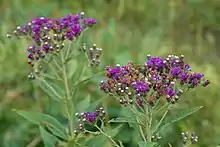Vernonia baldwinii
Vernonia baldwinii, the western ironweed or Baldwin's ironweed, is a perennial herb native to central North America.[1]
| Vernonia baldwinii | |
|---|---|
 | |
| Vernonia baldwinii inflorescence | |
| Scientific classification | |
| Kingdom: | Plantae |
| Clade: | Tracheophytes |
| Clade: | Angiosperms |
| Clade: | Eudicots |
| Clade: | Asterids |
| Order: | Asterales |
| Family: | Asteraceae |
| Genus: | Vernonia |
| Species: | V. baldwinii |
| Binomial name | |
| Vernonia baldwinii Torr. | |
Description
Vernonia baldwinii is a perennial herb with rhizomes. Its stems are densely tomentose, branched, and range up to 1.2 m (3 ft 11 in) in height. Its leaves are cauline and alternate, and are about 15 cm (5.9 in) in length and 4.5 cm (1.8 in) in width.[2] It has purplish, discoid inflorescences on short, tomentose peduncles.[3]
It grows in dry soil in prairies, pastures, open grounds, and woods, ranging from Iowa to Missouri, Nebraska, Kansas, and Texas.[3][4]
Taxonomy
The genus Vernonia is named for the English botanist William Vernon, and the species baldwinii is named for William Baldwin, the American botanist and physician who collected the plant.[5]
The common name "western ironweed" is derived from the range of the plant, the western United States, and derived from the toughness of the stem and roots of the plant.[5]
References
- "Vernonia baldwinii". Natural Resources Conservation Service PLANTS Database. USDA. Retrieved 9 September 2018.
- Robert H. Mohlenbrock (2017). Flowering Plants: Asteraceae. The Illustrated Flora of Illinois. 3. SIU Press. p. 89. ISBN 9780809336067.
- United States Agricultural Research Service, Clyde Franklin Ree (1970). Common Weeds of the United States - Issue 366 of Agriculture handbook (illustrated, reprint, revised ed.). Courier Corporation. p. 442. ISBN 9780486205045.CS1 maint: uses authors parameter (link)
- Nathaniel Lord Britton, Addison Brown (1913). An Illustrated Flora of the Northern United States: Canada and the British Possessions from Newfoundland to the Parallel of the Southern Boundary of Virginia, and from the Atlantic Ocean Westward to the 102d Meridian. 3 (2 ed.). C. Scribner's Sons. p. 353.
- Amanda Neill, ed. (2005). A Dictionary of Common Wildflowers of Texas & the Southern Great Plains (illustrated ed.). TCU Press. p. 160. ISBN 9780875653099.
External links
 Media related to Vernonia baldwinii at Wikimedia Commons
Media related to Vernonia baldwinii at Wikimedia Commons Data related to Vernonia baldwinii at Wikispecies
Data related to Vernonia baldwinii at Wikispecies